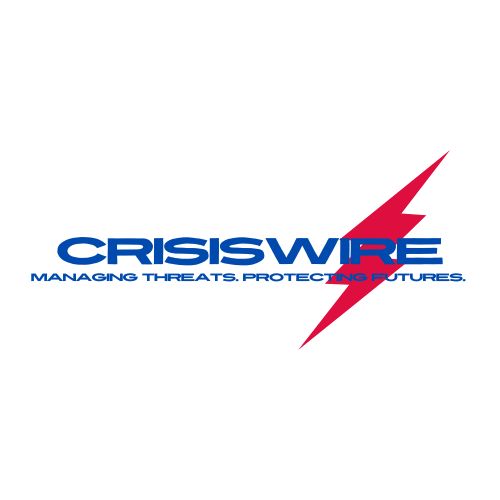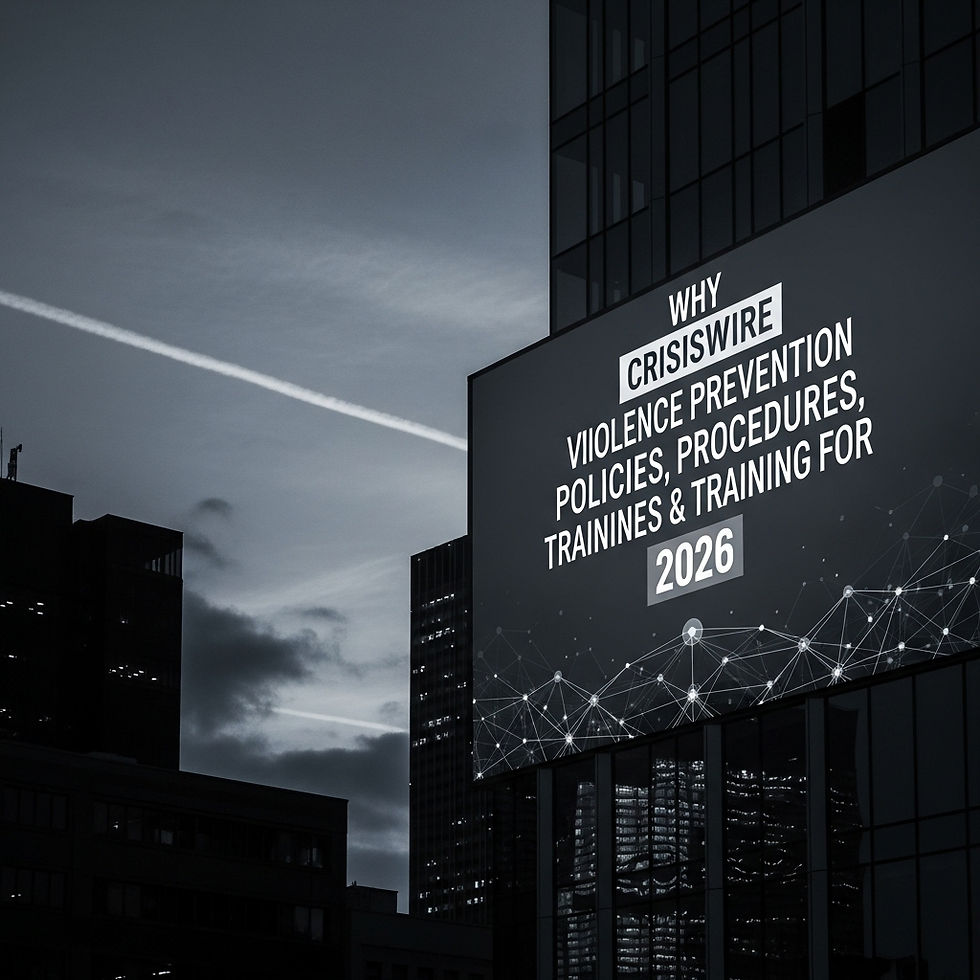Hawaii's High-Traffic Retailers Face Escalating Security Threats: Why Ala Moana and Waikiki Stores Need Professional Threat Assessment
- CrisisWire

- Oct 26, 2025
- 7 min read
By Warren Pulley, CrisisWire Threat Assessment Expert
On Black Friday 2024, a disgruntled former employee entered a California Target store with a firearm, targeting the manager who terminated him two weeks earlier. Three customers were injured in the crossfire before off-duty police neutralized the threat.
The warning signs were obvious in retrospect—threatening social media posts, confrontational termination meeting, explicit statements about "getting even." Yet no threat assessment was conducted before the firing, and no security protocols were updated after termination.
Hawaii's retailers face identical risks with significantly fewer resources.
When Nordstrom Ala Moana, Macy's, or Target Honolulu terminate employees, most lack formal threat assessment protocols. When Louis Vuitton, Gucci, or Chanel stores in Royal Hawaiian Center face shoplifting escalation or organized retail crime, response depends on Honolulu Police Department resources that may be committed elsewhere.
Geographic isolation amplifies every security failure. Mainland retailers can deploy regional crisis teams within hours. Hawaii operates 2,500 miles from corporate security headquarters, specialized threat assessment consultants, and federal law enforcement support.
CrisisWire Threat Management Solutions addresses these vulnerabilities through comprehensive retail security programs designed specifically for Hawaii's unique operational environment.
The Five Critical Threats Facing Hawaii Retailers
1. Workplace Violence from Terminated Employees
Risk profile: Retail experiences higher termination rates than most industries—seasonal layoffs, performance-based firings, theft-related terminations. Each creates potential for violent retaliation.
Recent incident: A former Best Buy employee in Los Angeles returned to the store six months after termination and assaulted the loss prevention manager who caught him stealing merchandise. The employee had posted threatening messages on social media for weeks—messages the company never monitored.
Hawaii vulnerability: When Apple Store Ala Moana or Lululemon terminate employees for policy violations, those individuals remain in tight-knit island communities with easy access to former workplaces and colleagues. Unlike mainland retailers where terminated employees relocate, Hawaii's geography keeps them local and potentially fixated.
Solution: CrisisWire's Workplace Violence Prevention Solutions include mandatory pre-termination threat assessments, post-termination monitoring protocols, and rapid response planning when concerning behaviors emerge.
2. Organized Retail Crime and Flash Mob Theft
Risk profile: Coordinated groups targeting high-value merchandise in quick "smash and grab" operations, often involving 10-20 participants overwhelming security within minutes.
Mainland pattern: Luxury retailers in San Francisco, Los Angeles, and New York have experienced waves of organized theft where groups clear entire display cases in under three minutes. Sephora, Neiman Marcus, and Bloomingdale's stores nationwide report losses exceeding $2 million annually per location.
Hawaii-specific risk: Waikiki's tourist-dense environment makes Prada Royal Hawaiian Center and other luxury retailers attractive targets. Thieves blend into tourist crowds, and island geography limits escape routes—but also delays mainland law enforcement response when local resources are overwhelmed.
Solution: CrisisWire's Physical Threat Assessments identify vulnerabilities in store layouts, security camera coverage, alarm response times, and staff emergency protocols. Recommendations include coordinated response with neighboring retailers in Ala Moana Center and Royal Hawaiian Center.
3. Active Shooter Threats in High-Density Shopping Centers
Risk profile: Shopping malls represent soft targets with high casualty potential. The 2019 El Paso Walmart shooting killed 23 people, while the 2022 Chesapeake Walmart shooting killed six employees.
Mathematical reality: Ala Moana Center attracts 56 million visitors annually—the highest foot traffic of any open-air shopping center in the United States. Zara, H&M, Uniqlo, and neighboring stores operate in one of the nation's highest-density retail environments.
Hawaii challenge: When active shooter incidents occur in mainland malls, regional SWAT teams, FBI, and specialized trauma centers respond within minutes. Hawaii retailers depend on Honolulu PD resources that must cover the entire island simultaneously. Maui retailers like TJ Maxx Maui Mall Village and Whole Foods Kahului face even longer response times.
Solution: CrisisWire's Active Shooter Preparedness Consulting includes facility-specific evacuation planning, staff response training, and coordination with local law enforcement. Training follows FEMA IS-907: Active Shooter protocols adapted to retail environments.
4. Insider Threats from Employees with Access
Risk profile: Retail employees with system access can steal customer payment data, commit inventory fraud, or sabotage operations. The 2013 Target breach compromised 40 million credit cards—initiated through a vendor's stolen credentials.
Common scenario: A Victoria's Secret Waikiki employee facing financial crisis begins processing fraudulent returns, pocketing cash while manipulating inventory systems to hide the theft. The scheme runs for months before detection, costing $50,000+ in direct losses plus customer trust damage.
Hawaii risk amplification: Small talent pools mean retailers rehire employees who've worked at competing stores—each bringing system knowledge, customer databases, and operational intelligence from previous employers. When ABC Stores hires former employees from other Waikiki retailers, they inherit both expertise and potential vulnerabilities.
Solution: CrisisWire's Insider Threat Management programs include behavioral monitoring, pre-termination risk assessments, and access control audits. Methodology detailed in How to Conduct an Insider Threat Audit.
5. Customer-Initiated Violence and Harassment
Risk profile: Disputes over returns, confrontations about mask policies, or personal grievances against staff can escalate to physical assault. Retail workers experience workplace violence at rates 50% higher than other industries.
Increasing frequency: A 2024 survey found 68% of retail workers experienced customer harassment or threats in the past year—up from 42% in 2019. Front-line employees at stores throughout Ala Moana Center and Kahala Mall report regular verbal abuse, with physical assault incidents rising.
Hawaii-specific dynamic: Tourist-heavy environments like Waikiki Shopping Plaza create unique tensions—jet-lagged visitors, alcohol consumption, cultural misunderstandings, and high-value purchases all contribute to elevated conflict risk. Employees at stores serving predominantly tourist clientele face different threat profiles than suburban retailers.
Solution: CrisisWire provides Specialized Security Training teaching de-escalation techniques, threat recognition, and emergency response protocols specific to retail environments. Training includes scenarios tailored to Hawaii's tourist-retail interface.

Federal Requirements Retailers Are Violating
OSHA workplace violence prevention requirements apply to all retailers—yet most Hawaii stores lack formal programs. California's SB 553 now mandates workplace violence prevention plans for all retailers with 10+ employees. Similar legislation is advancing nationwide, and Hawaii adoption is likely within 24 months.
The Department of Homeland Security designates shopping malls as potential terrorism targets requiring security assessments and emergency planning—obligations most retailers ignore until after an incident.
Federal Trade Commission data security requirements hold retailers liable for customer data breaches caused by inadequate insider threat controls—exactly what happened in the Target breach that cost the company $18.5 million in settlement payments.
Reference frameworks:
Why Hawaii Retailers Need Specialized Threat Assessment
Geographic isolation creates response delays. Mainland retailers facing security incidents deploy corporate crisis teams from regional offices within hours. Hawaii retailers wait days for mainland support while managing incidents with limited local resources.
Tourism environment increases complexity. Waikiki retailers serve international clientele with varying cultural norms, language barriers, and behavioral expectations. Security protocols must account for tourist-specific dynamics not present in mainland suburban malls.
Small talent pool amplifies insider threats. Retailers compete for the same employee base, meaning terminated workers easily move to competitors—bringing grievances, system knowledge, and potential for sabotage.
Limited law enforcement resources. Honolulu PD serves the entire island including Waikiki's tourist district, meaning retail security incidents compete with higher-priority calls. Outer islands face even longer response times.
Regulatory compliance gaps. Most Hawaii retailers lack formal workplace violence prevention programs required by emerging federal and state legislation, creating liability exposure when incidents occur.
CrisisWire's retail security programs address these Hawaii-specific vulnerabilities through locally-adapted protocols developed over 40 years of threat assessment across military, law enforcement, and corporate environments.
What Comprehensive Retail Threat Assessment Includes
Vulnerability Assessment: Physical security evaluation of store layout, entry points, camera coverage, alarm systems, and evacuation routes. Identifies weaknesses exploitable by active shooters, organized retail crime groups, or violent ex-employees.
Behavioral Threat Assessment & Management (BTAM): Structured protocols for identifying concerning employee behaviors, customer threats, or escalating disputes before they become violent. Includes mandatory pre-termination threat assessments.
Emergency Response Planning: Facility-specific protocols for active shooter, fire, medical emergency, bomb threat, and natural disaster scenarios. Coordinates with local law enforcement and neighboring retailers.
Staff Training: Comprehensive education on threat recognition, de-escalation techniques, emergency response, and reporting procedures. Delivered through in-person sessions adapted to retail schedules.
Insider Threat Monitoring: Systems for detecting employees accessing sensitive data outside normal duties, processing fraudulent transactions, or exhibiting concerning behavioral changes.
Post-Incident Support: Crisis response when incidents occur, including investigation coordination, media management, employee counseling, and protocol improvement.
Watch training: Behavioral Threat Assessment Fundamentals
All services align with Partner Alliance for Safer Schools (PASS) methodologies and federal guidelines from FEMA, FBI, and DHS.
Implementation Process for Hawaii Retailers
Phase 1: Initial Assessment (2-3 weeks)
Site visit to evaluate physical security vulnerabilities
Review existing policies and incident response protocols
Interview management and security staff
Analyze historical incident data
Phase 2: Program Development (3-4 weeks)
Design facility-specific threat assessment protocols
Draft emergency response plans
Create training materials adapted to retail operations
Establish behavioral monitoring systems
Phase 3: Training & Implementation (4-6 weeks)
Conduct staff training on threat recognition and response
Train management on behavioral threat assessment
Test emergency protocols through tabletop exercises
Deploy monitoring and reporting systems
Phase 4: Ongoing Support
Monthly threat assessment team meetings
Quarterly training refreshers
Annual program audits and updates
24/7 incident response consultation
Services scale from single-location boutiques to multi-store operations across the Hawaiian Islands.
Access resources:
Case Study: Retail Security Program Comparison
Protected Retailer: A Honolulu luxury retailer implemented CrisisWire's comprehensive threat assessment program including pre-termination protocols, employee behavioral monitoring, and emergency response training. When a terminated employee posted concerning social media content, the threat assessment team activated monitoring protocols and coordinated with HPD. The employee was intercepted before reaching the store. Total cost: $35,000 program implementation. Result: Zero incident, maintained customer confidence.
Unprotected Retailer: A mainland department store chain terminated an employee without threat assessment. The employee returned 48 hours later and assaulted three workers before being restrained. Losses included $2.1 million lawsuit settlement, $800,000 in increased insurance premiums, executive terminations, and immeasurable reputation damage. The company now implements mandatory pre-termination threat assessments across all locations.
Read analysis: Case Study: SMBs That Survived vs. Collapsed
Get Professional Threat Assessment for Your Retail Operation
CrisisWire provides comprehensive security solutions for Hawaii retailers of all sizes—from boutique stores to anchor tenants in major shopping centers.
Services leverage 40 years of experience across U.S. Air Force security operations, law enforcement, diplomatic protection, and corporate security environments, combined with 30+ certifications including U.S. State Department Worldwide Protective Specialist, BTAM Certified, and 20+ FEMA credentials.
Methodologies are detailed in published research at Academia.edu/crisiswire and validated through implementation across educational institutions, corporate environments, and government facilities.
Contact CrisisWire:
Email: crisiswire@proton.me
Quick Contact: bit.ly/crisiswire
Additional Resources:
About the Author:
Warren Pulley is founder of CrisisWire Threat Management Solutions with 40 years of experience spanning U.S. Air Force security, LAPD, Baghdad Embassy Protection, and Director of Safety at Chaminade University of Honolulu.
He holds 30+ certifications including U.S. State Department Worldwide Protective Specialist and is a member of the Partner Alliance for Safer Schools (PASS). Featured by ABC7 Los Angeles and NPR as a threat assessment expert. Research available at Academia.edu/crisiswire.




Comments